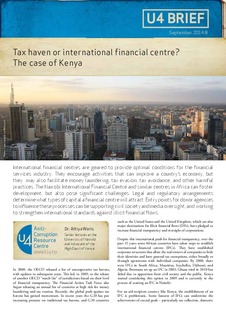| dc.contributor.author | Waris, Attiya | |
| dc.date.accessioned | 2018-01-04T08:19:11Z | |
| dc.date.available | 2018-01-04T08:19:11Z | |
| dc.date.issued | 2014-09-17 | |
| dc.identifier | oai:www.cmi.no:5242 | |
| dc.identifier.citation | Bergen: Chr. Michelsen Institute (U4 Brief 2014:8) 4 p. | |
| dc.identifier.uri | http://hdl.handle.net/11250/2474964 | |
| dc.description.abstract | International financial centres are geared to provide optimal conditions for the financial services industry. They encourage activities that can improve a country’s economy, but they may also facilitate money laundering, tax evasion, tax avoidance, and other harmful practices. The Nairobi International Financial Centre and similar centres in Africa can foster development, but also pose significant challenges. Legal and regulatory arrangements determine what types of capital a financial centre will attract. Entry points for donor agencies to influence these processes can be supporting civil society and media oversight, and working to strengthen international standards against illicit financial flows. | |
| dc.language.iso | eng | |
| dc.publisher | Chr. Michelsen Institute | |
| dc.relation | U4 Brief | |
| dc.relation | 2014:8 | |
| dc.relation.ispartof | U4 Brief | |
| dc.relation.ispartofseries | U4 Brief 2014:8 | |
| dc.relation.uri | https://www.cmi.no/publications/5242-tax-haven-or-international-financial-centre | |
| dc.subject | International Drivers of Corruption | |
| dc.subject | Illicit Financial Flows | |
| dc.subject | Tax Havens | |
| dc.subject | International Financial Centres | |
| dc.subject | Money Laundering | |
| dc.subject | Corruption | |
| dc.subject | Kenya | |
| dc.title | Tax haven or international financial centre? The case of Kenya | |
| dc.type | Report | |
